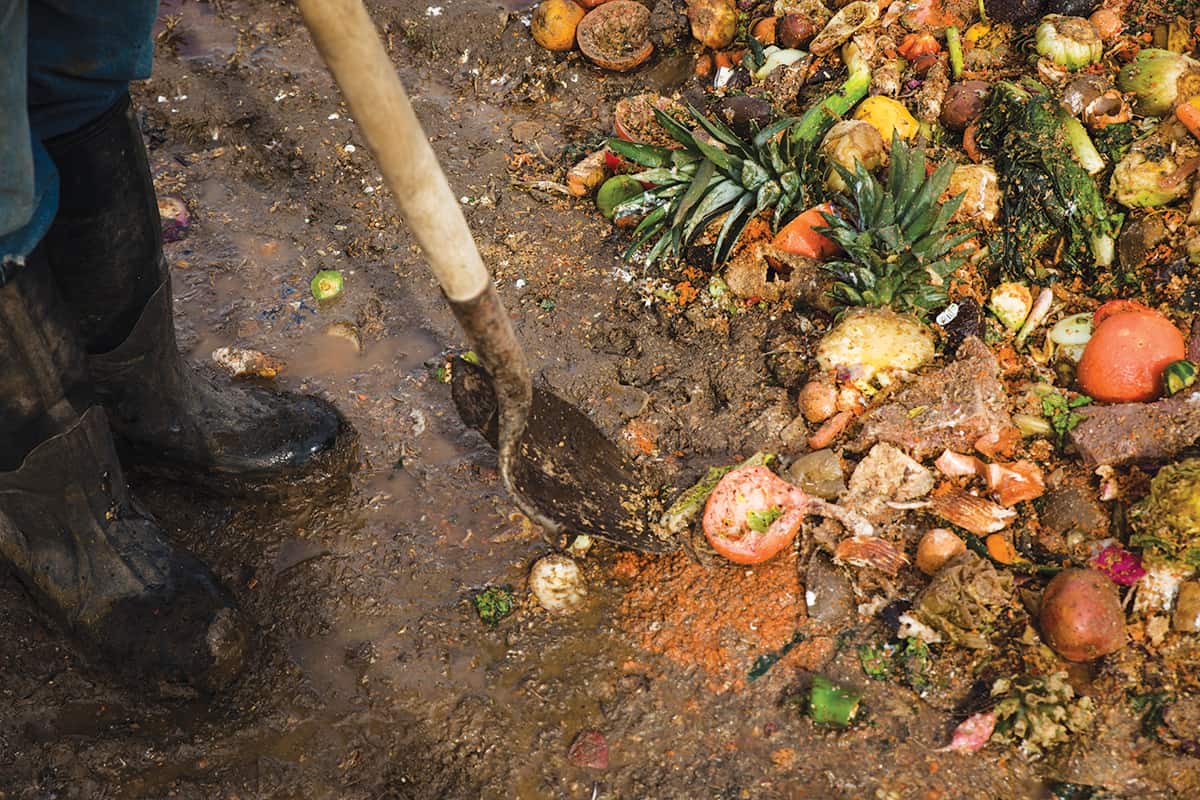By Deb Barracato // Photography by Kathryn Ziesig
—
Since the start of the Industrial Revolution in the mid-1700s, human activity has increased the total mass of greenhouse gases in the Earth’s atmosphere—particularly carbon dioxide from the burning of fossil fuels—by more than 40 percent. As a result, the average global temperature has risen 2°F, which may not seem significant but is enough to alter entire ecosystems. If current emissions and warming trends continue, climate scientists say, the effects could be catastrophic.
Curtis Haderlie did not set out to solve the existential threat of climate change when he started collecting food scraps for composting in 2018. He simply wanted to close the loop on a local food cycle. His farm, Haderlie Farms in Thayne, Wyoming, sells produce that is grown using organic principles, and grass-finished beef, pork, and dairy products directly to consumers in Teton, Lincoln, and Sublette counties. Collecting organic waste from those same customers seemed like a logical next step, one that would provide him with a plentiful source of clean, nutrient-rich compost for his fields. What he didn’t know is that his business brainstorm underlies what many climate experts call the best possibility for a near-term tool to stem global warming.
The Case for Composting
According to the Food and Agricultural Organization of the United Nations, global food waste ranks near the top of the list of climate offenders. Food and other organic waste decomposing in landfills emits methane, a less plentiful but extremely potent greenhouse gas that absorbs heat more effectively than carbon dioxide, accelerating global warming. Methane-producing bacteria flourish in anaerobic conditions, and organic waste buried in oxygen-deprived landfills provides just the feast they need.
The United States Environmental Protection Agency estimates that in 2017, only 6.3 percent of the nearly 41 million tons of food waste generated in the U.S. was diverted from landfills for composting. In fact, more food reaches landfills and incinerators than any other single material in everyday trash, constituting 22 percent of discarded municipal solid waste.
Composting biodegradable waste produces a nutrient-rich soil amendment without generating methane. Modeling done by Project Drawdown, a global research organization, shows implementing composting worldwide could reduce methane emissions by 2.3 billion tons over the next 30 years. Composting also enhances the carbon sequestration capabilities of soil, which occurs primarily through plant photosynthesis. Healthy, abundant vegetation and crops maximize this process, naturally pulling carbon dioxide out of the air before it can escape into the atmosphere.
WyoFarm Composting
Out at the farm in Thayne, 10-foot-high piles of decomposing scraps generate enough heat to prevent snow from sticking in the winter. Stretching 30 feet across and hundreds of feet long, the heaps attest to the approximately 480 tons of food waste Haderlie collected in Teton County in 2019, which produced about 800 cubic yards of compost. For context, one cubic yard would cover a 10-by-10-foot garden with 3 inches of compost.

While Haderlie theoretically supports backyard composting, he believes his commercial operation, called WyoFarm Composting (wyocompost.com), provides a more effective system given the extremes of our Teton environment. Compost requires a steady temperature of greater than 141 degrees, which is more easily generated in large piles, plus a steady flow of oxygen, maintained by consistently turning the material. Backyard compost piles here generally go dormant for the winter and never produce the heat required to process meat scraps, bones, and shells. They can also create a nuisance with neighborhood critters, both domestic and wild.
Haderlie makes the commitment to composting easy for his farm customers by providing collection buckets, maintaining convenient drop-off locations in Jackson Hole three days a week, and offering the option of driveway pickup. An average family of four generally fills a 5-gallon bucket in a week, he says. Commercial output varies depending on size, but he provides 32-gallon green roller carts that are easy to distinguish from standard trash cans for commercial use. He can also provide bear-proof containers.

When commercial customers first come on board, Haderlie finds it helpful to explain the process to the staff, emphasizing the importance of sorting the food waste from non-compostable trash. It’s much easier to separate when it goes into the bin than at the farm. Contamination such as glass, metal, or plastic doesn’t always become apparent until the composting process breaks down the food scraps enough to reveal materials that don’t belong. At that point, Haderlie says, he can effectively pull them out, but then he must add a run to the dump on top of his time spent sorting.
Composting Customers
Haderlie introduced his composting business at the Jackson EcoFair in May 2018. Since then he has picked up about 130 residential and 60 or so commercial customers, including Jackson Hole Airport, St. John’s Health, and Four Seasons Resort and Residences.
As the nutrition services manager and sustainability coordinator at St. John’s hospital, Lisa Smith, MS, RDN, diverts more than 21 tons of food scraps to WyoFarm Composting in a year. The kitchen staff readily accepted the task of separating the waste, she says. “They were already doing a good job of recycling, so it was natural to move to food composting.”
They primarily collect food prep scraps from the kitchen, such as fruit skins and vegetable peels. Smith says it costs less to send waste to Haderlie than to have it taken to the county trash transfer station. And as an added benefit, it’s easier to wheel the collection bin out for pickup than to carry bags of trash to the dumpster. But the hospital’s motivation isn’t so much economical or operational as it is an expression of its corporate sustainability values.
Out at the Four Seasons in Teton Village, Joseph Yarrow, director of purchasing and eco-team leader, cites a similar motive for separating food scraps. “Being one of the larger employers in Teton County, we really want to leave as small a footprint as we can on the ecosystem,” he explains. By positioning roller carts in all dish stations, food prep areas, and the banquet section, they’re able to collect roughly 90 percent of their food waste, he says.
Amelia Hatchard, owner of StreetFood @ the Stagecoach in Wilson and Butter in Victor, catered a party in February for Rendezvous Event Management that took place at the Jackson Hole Center for the Arts. It was the first time she used the WyoFarm service, and while it took some effort to source disposable plates, cutlery, napkins, and cups that would pass Haderlie’s strict standards for composting, the actual process of collecting the material onsite was quite easy, she says, since everything could go in the same bin.
While Haderlie doesn’t currently market his compost as a farm commodity—“We’re in the business of selling food,” he says—he does sometimes swap buckets of scraps for buckets of finished compost. And he often waives the drop fee for farm customers, who are the folks he wants in the loop. He does foresee growth in the composting operation, but for now he uses the majority of what he produces in his own fields.
“Compost for me is black gold.”
WyoFarm Accepts
—
- Fruits and vegetables
- Breads, grains, and seeds
- Meat, dairy products, bones, and shells
- Coffee grounds, paper filters, and tea bags (without staples)
- Paper napkins, wax paper, and muffin liners
WyoFarm Cannot Process
—
- Plastics or Styrofoam
- Chemicals, metals, or glass
- Pet waste or diapers
- Non-organic materials
- Yard trimmings
- Plastic wrap, twist ties, stickers, and rubber bands
- Disposable serviceware labeled “biodegradable” or “compostable”

